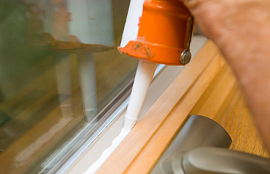According to Department of Energy figures, heating and cooling account for over half the energy use in the typical home in America. This means that it is the largest energy expense in your home, so as the warmer weather approaches, it is the ideal time to check for any air leaks.
What’s the Big Deal About Air Leaks?
Although it may seem like a minor issue, air leaks can actually have a massive impact on your home. An air leak allows warm air to leak into the home in the hot summer weather and allow your warmed air to escape in winter, wasting a great deal of energy. Research suggests that as much as 25% of the heating inside your home can be lost through small holes and cracks. So, it is important to ensure that any air leaks are properly sealed to prevent the loss of heated air and stop the summer hot air leaking into your home.
Air leaks will force your air conditioner to work harder and harder to maintain your desired temperature. As your home loses precious cooled air and hot air infiltrates the rooms, it will create an inconsistent temperature, so your air conditioner will be forced to run for longer and longer periods to compensate.
By ensuring that your home is insulated and adequately sealed, you can save energy and money. This will allow your home to retain the cooled air from your air conditioning system to maintain your desired comfort level on even the hottest days.
Detecting Air Leaks
One of the most challenging aspects of having air leaks in your home is detection. Fortunately, experienced HVAC professionals can perform home evaluation studies to check for air leaks and make recommendations to remedy the issue. If you would prefer a more DIY approach, the International Association of Certified Home Inspectors recommends using an incense stick to detect any leaks. Light your stick and walk through each room, paying attention to doors, outlets, and windows for cracks and holes. If the smoke from your incense stick begins to blow sideways, it is a sign that there is an air leak nearby.
Repairing any Air Leaks
According to research, air is most likely to escape through floors, walls, and ceilings, but you may still find air leaks in your ductwork, doors, windows and even outlets. So, the approach for repairing the leak will depend on its source. Most leaks can be sealed with caulking, spray foam or weather stripping, but if you are unsure about repairing an air leak, it is best to consult an experienced professional. Ductwork air leaks can be particularly problematic and can allow dust, mold and other debris to compromise your air quality in addition to wasting energy.
Don’t Forget Insulation
Finally, you need to think about insulation. Inadequate insulation will compromise efficiency and allow cooled air to escape your home. In addition to checking for air leaks, you should also check whether there is sufficient insulation, particularly in your attic, around doors and window frames and around your ductwork.
